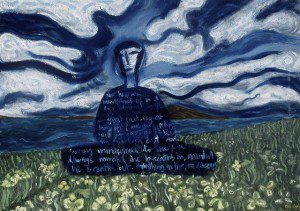By Luke Sumpter
Guest Writer for Wake Up World
The hedonic treadmill – or hedonic adaptation – are psychological terms used to describe the theory that humans have a base line emotional state that we all inevitably return to after events that cause us great happiness and personal gain or mass loss and sadness.
The consumer and capitalist ideals conditioned into and practiced by the majority of westerners is a prime example of this theory. Not a long period of time exists between obtaining a new sports car, a new job promotion or the latest smart phone until the insatiable desire for then next best thing is set into motion.
Let it be made clear that there is absolutely nothing wrong with the desire to strive, achieve and obtain. It is our birthright to pursue our passions and embody our dreams and ultimately to optimize ourselves. Yet there is a firm difference between achieving a goal and valuing the outcome in comparison to seeing an endeavor to completion to then disregarding the results in favor of continual and constant progression.
Fortunately, upon reflection of our rich and diverse past, we who inhabit the 21st century have been gifted with many different schools of thoughts and techniques that can help to remove us from this treadmill of unsatisfied desire and place us slowly strolling barefoot in the pastures of gratitude.
The philosophical school of Stoicism was founded by Zeno of Citium in Athens during the early 3rd century BC and was developed and pondered further by philosophers of such magnitude as Seneca, Epictetus, and Marcus Aurelius. One of the main teachings of this branch of thinking was to ward of destructive emotions through install thorough self-control.
Marcus Aurelius hit the nail on the head with his words of profound wisdom in the following quote:
“If you are distressed by anything external, the pain is not due to the thing itself, but to your estimate of it; and this you have the power to revoke at any moment.” These words can easily be applied to many external stimuli that may cause displeasure, whether it be a person or perhaps a
pined after material possession.”
One of the most effective and powerful methods within the Stoic tool kit to achieve liberation from hedonistic tendencies is a technique known as negative visualization. Now, many visualization techniques revolve around the idea of bringing to one’s mental attention that which one most desires in order to stand a greater chance of obtaining it. In polar contrast, negative visualization earns its potency by taking into consideration that which one already owns or is gifted with and then proceeding to imagining one’s life without it. Thus, making one aware of the value of the object or person they may have been taking for granted.
For example, take a second to imagine all of the food you have stored away in your home that will inevitably satisfy your hunger and keep you alive. Now visualize that it suddenly ceases to exist and disappears. What would you be left with? Not only an empty and groaning stomach, but potentially starvation and death. Or how about that wall behind you? Perhaps you have never paid attention to it before, remaining ignorant to the fact that without it you would be exposed to the disregard of the elements such as the intense burning of the suns rays or the bitter cold cutting edge of the wind.
When this technique is then applied to our loved ones in the form of close friends and family it’s true value is revealed. The next time you kiss your partner or the next time you read your child their favorite bed time story, imagine and visualize it to be the last time. Although this has morbid undertones, it also makes the heart ring, and maybe even ache, with gratitude.
There is a great deal of power in choosing which lens you choose to view life through. Altering your perception from ‘what is it that I need?’ to ‘what is it that I have?’ literally boils down to a choice. You can choose to constantly attempt to improve and augment your existence through desire for something more, there is after all nothing wrong with this, it would be foolish not to want to achieve your optimal potential.
On the other hand, you can choose to realize and embody the fact that, if you are reading this, you are most likely in a more advantageous position that the vast amount of human beings that have ever existed through time, and that exist upon planet Earth today. You probably have access to clean water, advanced health care both allopathic and holistic and basic electricity. At times it appears that the only reason we may wish to hunt down something new is purely because we have become blind to what we truly have.
It is only when we awaken from the suffocating slumber of hedonistic ignorance that we can experience the dawn of what it means to be happy and content. You have legs to climb a mountain and vision to soak in the view upon its celestial summit. You have ears to be told you are loved and a mouth from which to proclaim mutuality. You have a heart that beats and a mind that seeks. You have lips to be graced, that unfold into a smile across your face.
You have you.
Previous articles by Luke Sumpter:
- Liberation Through Lucid Living – Finding Consciousness Within the Dream
- Lucid Living – Creating Your Lucid Reality
About the author:
 Luke Sumpter is 21 years old and resides in the UK. He is a writer, journalist and poet, whose main focus is on health and well being, mind-body medicine and mysticism. Luke has written for Reset.me, Elephant Journal and The Mind Unleashed on these topics, and in addition to developing a community known as ‘The Art of Wellness’ to spread the message of holistic health, healing and philosophy, he is currently waiting to start his degree in Acupuncture in London.
Luke Sumpter is 21 years old and resides in the UK. He is a writer, journalist and poet, whose main focus is on health and well being, mind-body medicine and mysticism. Luke has written for Reset.me, Elephant Journal and The Mind Unleashed on these topics, and in addition to developing a community known as ‘The Art of Wellness’ to spread the message of holistic health, healing and philosophy, he is currently waiting to start his degree in Acupuncture in London.
You can connect with Luke via ‘The Art of Wellness’ on Facebook.

If you've ever found value in our articles, we'd greatly appreciate your support by purchasing Mindful Meditation Techniques for Kids - A Practical Guide for Adults to Empower Kids with the Gift of Inner Peace and Resilience for Life.
In the spirit of mindfulness, we encourage you to choose the paperback version. Delve into its pages away from screen glare and notifications, allowing yourself to fully immerse in the transformative practices within. The physical book enriches the learning process and serves as a tangible commitment to mindfulness, easily shared among family and friends.
Over the past few years, Wake Up World has faced significant online censorship, impacting our financial ability to stay online. Instead of soliciting donations, we're exploring win-win solutions with our readers to remain financially viable. Moving into book publishing, we hope to secure ongoing funds to continue our mission. With over 8,500 articles published in the past 13 years, we are committed to keeping our content free and accessible to everyone, without resorting to a paywall.







